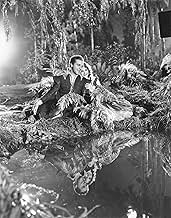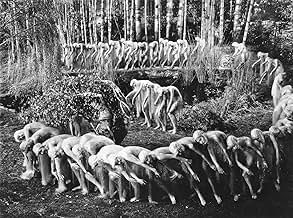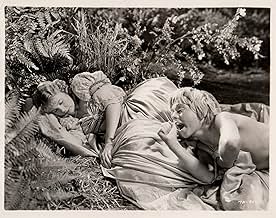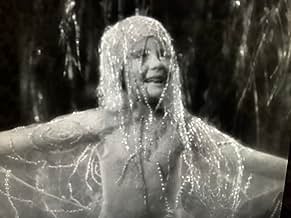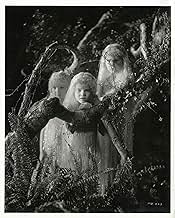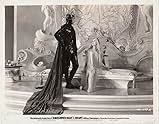IMDb-BEWERTUNG
6,8/10
4107
IHRE BEWERTUNG
Füge eine Handlung in deiner Sprache hinzuTwo couples and a troupe of actors have an encounter with some mischievous fairies in the forest.Two couples and a troupe of actors have an encounter with some mischievous fairies in the forest.Two couples and a troupe of actors have an encounter with some mischievous fairies in the forest.
- Regie
- Drehbuch
- Hauptbesetzung
- 2 Oscars gewonnen
- 6 Gewinne & 2 Nominierungen insgesamt
Olivia de Havilland
- Hermia - In Love with Lysander
- (as Olivia de Haviland)
Nini Theilade
- Fairie - Attending Titania
- (as Nina Theilade)
Empfohlene Bewertungen
10artzau
Thalberg's pledge to give back to the people something good is seen in this project realized 66 years ago. Everyone is acting! No one struts or swains, dying to be a star. The young, superlovely Olivia de Havilland is a gorgeous and fun Hermia in her maiden role. Dick Powell and Ross Alexander as the two Athenian youths confused by Puckish Mickey Rooney Robin Goodfellow are wonderful in their entanglement with beautiful Jean Muir's Helena. The players, Frank McHugh, Dewey Robinson, Hugh Herbert, Grant Mitchell and the wonderful snob's snob, Arthur Treacher are topped by Jimmy ("you dirty rat") Cagney [trivia buffs know he never said those lines except in response to Gorshen and Rich Little's impressions of him at a roast before his death] and Joe E. Brown's Flute. Victor Jory, often cast as a villain is great as Oberon, as is lovely Anita Louise as Titania. There's not a weak spot in this cast and the entire play, in living Black and White, is soft, diffused and whispery as a summer night. Erich W. Korngold's music is supplemented by the exquisite Mendelssohn score and look for a tiny Billy Barty as Mustardseed, one of the sprites. There are other fine ones, the RSC's 1968 and the recent 1999 are wonderful, but, fans, take it from an old Shakespeare buff, this one is an immortal production.
Since "Shakespeare in Love" made that particular playwright happening and new, check out this, Warner Bros.' wild, expensive, free-wheeling adaptation of "A Midsummer Night's Dream".
For me, James Cagney makes the movie. He's Nick Bottom, the leader (or so he believes) of a traveling troupe of actors. He gives an invigorating performance--the screen is his. At one point, he gets to wear a donkey's head (if you know the play, you know what I'm talking about), but it doesn't faze him in the least. Cagney, the most energetic screen actor, doesn't let his over-the-top approach mar his skill or care with The Bard's great words. It's the test of anyone wishing to act out a part in a Shakespeare play, which Cagney passes, to "speak" the dialogue, and by doing so, make what might be confusing on the page understandable to audiences on the screen or stage.
Warner really spared no expense with this production, which I think might have been the costliest of that year. The whole affair is like a dream in every way--it seems to sway in the wind, fragile to the touch. It features Mendolssohn music, soft-white photography (the great Hal Mohr), and some of the most incredible sets and costumes you're likely to see in a 1930s film.
Nominated for three Academy Awards: Picture, Cinematography and Editing. Bested by "Mutiny on the Bounty" for the first, it won the other two.
For me, James Cagney makes the movie. He's Nick Bottom, the leader (or so he believes) of a traveling troupe of actors. He gives an invigorating performance--the screen is his. At one point, he gets to wear a donkey's head (if you know the play, you know what I'm talking about), but it doesn't faze him in the least. Cagney, the most energetic screen actor, doesn't let his over-the-top approach mar his skill or care with The Bard's great words. It's the test of anyone wishing to act out a part in a Shakespeare play, which Cagney passes, to "speak" the dialogue, and by doing so, make what might be confusing on the page understandable to audiences on the screen or stage.
Warner really spared no expense with this production, which I think might have been the costliest of that year. The whole affair is like a dream in every way--it seems to sway in the wind, fragile to the touch. It features Mendolssohn music, soft-white photography (the great Hal Mohr), and some of the most incredible sets and costumes you're likely to see in a 1930s film.
Nominated for three Academy Awards: Picture, Cinematography and Editing. Bested by "Mutiny on the Bounty" for the first, it won the other two.
Pre-1950 film adaptations of Shakespeare's plays have varied in quality. Some were good and more, especially Laurence Olivier's brilliant 1948 adaptation of 'Hamlet', though that is something to see on its own terms. Others were average or less, with one example being the 1936 film of 'As You Like It', which was very static and stagy and had a badly miscast Rosalind. Had little doubt that this film would be at least above average, considering that the play is one of Shakespeare's best and because the cast is so good.
1935's 'A Midsummer Night's Dream' is a dream. To me it is not just the best screen/film adaptation of 'A Midsummer Night's Dream' (bar none), it is also one of the best film versions of any Shakespeare play pre-1950 and perhaps overall. As well as one of the best adaptations of 'A Midsummer Night's Dream' full stop, for me only the National Theatre Live and Julie Taymor productions are better though once again as standalones. It has very few if any of the things that other early Shakespeare film adaptations did and is full of magic and entertainment value. It's not perfect, but there is so much to adore here.
For one thing, the photography is exquisite and the settings and such are very lavish and rustic. The world one is immersed in being truly fantastical. Also loved the use of Mendelssohn's music, the music itself some of his best loved for good reason (and he was only 16 when he wrote it!) and it is used cleverly and tastefully. Korngold's, one of my favourite film composers, contribution is typically lush and rousing without being over-scored.
The dancing is beautifully choreographed and danced with great grace and elegance, as well as shot and edited in an appropriately dream-like way. The writing is still incredibly funny, without trying too hard, and also beautifully poetic. The story is incredibly charming and told with great spirit, doing nothing to confuse a story that is already quite complicated. The action is opened up enough to not betray stage origins and the atmosphere is suitably magical. The direction is beautifully theatrical, Reinhardt's theatre roots are evident without hurting the drama. The comedy hits the mark, especially with Bottom.
Most of the performances are great, with two exceptions. James Cagney is a sheer delight as Bottom in a role that is so different to what he was usually cast as and shows that he did have a light and funny side to him. Mickey Rooney's performance has left people more mixed, count me in as one of the people that loved his Puck and consider it one of his better performances. The mischievous energy he embodies is infectious. Olivia De Havilland is a charming Hermia and Victor Jory a sinister, amusing and textbook Oberon. Anita Louise's Titania is spirited and regal and Ian Hunter and Joe E. Brown are very good.
Only two performances don't come over as well. One is Dick Powell, who is very bland and too earnest. The other is the very irritating Hugh Herbert, who was always an acquired taste and was very take and leave for me.
Also found the finale on the overblown side.
Concluding however, great. 9/10.
1935's 'A Midsummer Night's Dream' is a dream. To me it is not just the best screen/film adaptation of 'A Midsummer Night's Dream' (bar none), it is also one of the best film versions of any Shakespeare play pre-1950 and perhaps overall. As well as one of the best adaptations of 'A Midsummer Night's Dream' full stop, for me only the National Theatre Live and Julie Taymor productions are better though once again as standalones. It has very few if any of the things that other early Shakespeare film adaptations did and is full of magic and entertainment value. It's not perfect, but there is so much to adore here.
For one thing, the photography is exquisite and the settings and such are very lavish and rustic. The world one is immersed in being truly fantastical. Also loved the use of Mendelssohn's music, the music itself some of his best loved for good reason (and he was only 16 when he wrote it!) and it is used cleverly and tastefully. Korngold's, one of my favourite film composers, contribution is typically lush and rousing without being over-scored.
The dancing is beautifully choreographed and danced with great grace and elegance, as well as shot and edited in an appropriately dream-like way. The writing is still incredibly funny, without trying too hard, and also beautifully poetic. The story is incredibly charming and told with great spirit, doing nothing to confuse a story that is already quite complicated. The action is opened up enough to not betray stage origins and the atmosphere is suitably magical. The direction is beautifully theatrical, Reinhardt's theatre roots are evident without hurting the drama. The comedy hits the mark, especially with Bottom.
Most of the performances are great, with two exceptions. James Cagney is a sheer delight as Bottom in a role that is so different to what he was usually cast as and shows that he did have a light and funny side to him. Mickey Rooney's performance has left people more mixed, count me in as one of the people that loved his Puck and consider it one of his better performances. The mischievous energy he embodies is infectious. Olivia De Havilland is a charming Hermia and Victor Jory a sinister, amusing and textbook Oberon. Anita Louise's Titania is spirited and regal and Ian Hunter and Joe E. Brown are very good.
Only two performances don't come over as well. One is Dick Powell, who is very bland and too earnest. The other is the very irritating Hugh Herbert, who was always an acquired taste and was very take and leave for me.
Also found the finale on the overblown side.
Concluding however, great. 9/10.
A Midsummer Night's Dream was to be Jack Warner's bow to culture back during the Depression. The economical studio which specialized in urban dramas was doing something that normally MGM would have taken the lead in. In fact I'm not so sure that Louis B. Mayer decided that if Warner Brothers could make Shakespeare popular, he could do it better and hence Norma Shearer got to star in Romeo and Juliet.
The great German Impresario producer Max Reinhardt with co-direction from another German emigrant, William Dieterle, put this together. He played to Warner Brothers other strength, those Busby Berkeley musicals and their intricate numbers. Visually, A Midsummer Night's Dream is stunning with an ethereal quality as the various faeries and nymphs go through the woods. They do their thing to Mendelsohn's great music as arranged by Erich Wolfgang Korngold. In fact this was the start of Korngold's relationship with the brothers Warner and some of the great musical scores he wrote for them.
This was also the start of Olivia DeHavilland's great career. Olivia is one of the few major stars who literally went from unknown to star in one fell swoop. She had graduated high school and was doing some summer stock before entering college when Max Reinhardt spotted here while touring America with A Midsummer Night's Dream. When Warner Brothers got his services for this film, he brought with him Olivia and personally cast her as Hermia.
The film was held up with editing, scoring, retakes, and Olivia made and was seen in two low budget films before A Midsummer Night's Dream was released. So her debut is in a Joe E. Brown film, Alibi Ike. But this is her first film.
The material was familiar to Olivia, but not all her fellow players at Warner Brothers were so blessed. Dick Powell said that this film was one of the two worst experiences he had while at that studio. He had no training of any kind to do this classical piece and said he was lost through out the whole production.
James Cagney is no classical actor either, but as Bottom with or without the donkey's head on him, courtesy of Puck, Cagney brings his boisterous style to the proceedings and it works for the most part. Some of the other tradespeople in the town Frank McHugh, Dewey Robinson and Joe E. Brown look pretty lost though.
On loan out from MGM, Mickey Rooney steals the show as Puck. On orders from Victor Jory the Faerie King to play a little joke on his wife Anita Louise, Rooney casts a spell on her that will make her fall for the first living soul she sees. Rooney decides on is own to sweeten the joke by giving James Cagney a donkey's head and making sure that Louise sees him first. And of course the four lovers, Dick Powell, Ross Alexander, Jean Muir, and Olivia DeHavilland, Rooney confuses their affections as well as a bonus.
Rooney who was another kid actor up to this point, got his first real critical notices in this. It led to his becoming a major star over at MGM and Louis B. Mayer never lending him out to anyone again as long as he was under contract there.
A Midsummer Night's Dream is a curious film. Shakespearean purists might recoil at some of the casting, but I'm sure it was entertaining enough for the Depression audiences.
The great German Impresario producer Max Reinhardt with co-direction from another German emigrant, William Dieterle, put this together. He played to Warner Brothers other strength, those Busby Berkeley musicals and their intricate numbers. Visually, A Midsummer Night's Dream is stunning with an ethereal quality as the various faeries and nymphs go through the woods. They do their thing to Mendelsohn's great music as arranged by Erich Wolfgang Korngold. In fact this was the start of Korngold's relationship with the brothers Warner and some of the great musical scores he wrote for them.
This was also the start of Olivia DeHavilland's great career. Olivia is one of the few major stars who literally went from unknown to star in one fell swoop. She had graduated high school and was doing some summer stock before entering college when Max Reinhardt spotted here while touring America with A Midsummer Night's Dream. When Warner Brothers got his services for this film, he brought with him Olivia and personally cast her as Hermia.
The film was held up with editing, scoring, retakes, and Olivia made and was seen in two low budget films before A Midsummer Night's Dream was released. So her debut is in a Joe E. Brown film, Alibi Ike. But this is her first film.
The material was familiar to Olivia, but not all her fellow players at Warner Brothers were so blessed. Dick Powell said that this film was one of the two worst experiences he had while at that studio. He had no training of any kind to do this classical piece and said he was lost through out the whole production.
James Cagney is no classical actor either, but as Bottom with or without the donkey's head on him, courtesy of Puck, Cagney brings his boisterous style to the proceedings and it works for the most part. Some of the other tradespeople in the town Frank McHugh, Dewey Robinson and Joe E. Brown look pretty lost though.
On loan out from MGM, Mickey Rooney steals the show as Puck. On orders from Victor Jory the Faerie King to play a little joke on his wife Anita Louise, Rooney casts a spell on her that will make her fall for the first living soul she sees. Rooney decides on is own to sweeten the joke by giving James Cagney a donkey's head and making sure that Louise sees him first. And of course the four lovers, Dick Powell, Ross Alexander, Jean Muir, and Olivia DeHavilland, Rooney confuses their affections as well as a bonus.
Rooney who was another kid actor up to this point, got his first real critical notices in this. It led to his becoming a major star over at MGM and Louis B. Mayer never lending him out to anyone again as long as he was under contract there.
A Midsummer Night's Dream is a curious film. Shakespearean purists might recoil at some of the casting, but I'm sure it was entertaining enough for the Depression audiences.
Early Hollywood wasn't known for its high-brow culture, and this film was an important step in enriching the cinema. The opening titles reveal how proud Warner Brothers were to have done it, and what a production it was indeed: all the top Warner's stars, the best technical support in the world, a top composer of the day in Erich Korngold, ballet choreography by Nijinska, and the highly respected Max Reinhardt as director. You couldn't have asked for more in those energetic movie days.
And, happily, it works! It's still beautiful, exciting, technically enthralling--and very funny! There are too many great performances to single out even one; but as an ensemble, the "players" are marvelous. No one seems stilted; everyone is right at home; even though most of these individuals hadn't been trained to the classical stage--they were just good! and, incidentally, it just goes to show the timelessness of the play itself.
Some scenes today seem overlong, and I think someone should have toned down little Mickey Rooney a good bit, but all in all it's a triumph. Midsummer or not, it's a sweet interlude.
And, happily, it works! It's still beautiful, exciting, technically enthralling--and very funny! There are too many great performances to single out even one; but as an ensemble, the "players" are marvelous. No one seems stilted; everyone is right at home; even though most of these individuals hadn't been trained to the classical stage--they were just good! and, incidentally, it just goes to show the timelessness of the play itself.
Some scenes today seem overlong, and I think someone should have toned down little Mickey Rooney a good bit, but all in all it's a triumph. Midsummer or not, it's a sweet interlude.
Wusstest du schon
- WissenswertesWhen the forest that Max Reinhardt designed could not be lit properly, cinematographer Hal Mohr thinned the trees slightly, sprayed them with aluminum paint and covered them with cobwebs and tiny metal particles to reflect the light. As a result, he became the first (and only) write-in winner of an Academy Award.
- PatzerCorrective lenses were introduced in the 13th century so they could have been worn in Shakespeare's time.
- Zitate
Hermia, in Love with Lysander: [to Helena] How low am I, you painted maypole? Speak! How low am I? I am not yet so low but that my nails can reach into your eyes!
- Crazy CreditsThe opening credits appear as if they were "trickling down" from the top of the screen.
- Alternative VersionenThe original 132-minute roadshow version of this film has been restored, shown on cable, and issued on videocassette and DVD. For many years, though, this film was shown only in its general release version, a 117-minute version painstakingly edited by the studio (so that the cuts would not be noticeable), which shifted the order of some sequences and eliminated others.The 2007 DVD release also restores the Intermission title card, not seen since the film's original roadshow release in 1935, as well as including the overture and exit music.
- VerbindungenFeatured in A Dream Comes True (1935)
- SoundtracksA Midsummer Night's Dream: Overture and Incidental Music
(1826) (uncredited)
Music by Felix Mendelssohn
Adapted by Erich Wolfgang Korngold
Heard throughout the film
Top-Auswahl
Melde dich zum Bewerten an und greife auf die Watchlist für personalisierte Empfehlungen zu.
- How long is A Midsummer Night's Dream?Powered by Alexa
Details
- Erscheinungsdatum
- Herkunftsland
- Offizieller Standort
- Sprache
- Auch bekannt als
- A Midsummer Night's Dream
- Drehorte
- Produktionsfirmen
- Weitere beteiligte Unternehmen bei IMDbPro anzeigen
Box Office
- Weltweiter Bruttoertrag
- 2.616.000 $
- Laufzeit
- 2 Std. 13 Min.(133 min)
- Farbe
- Sound-Mix
- Seitenverhältnis
- 1.37 : 1
Zu dieser Seite beitragen
Bearbeitung vorschlagen oder fehlenden Inhalt hinzufügen


